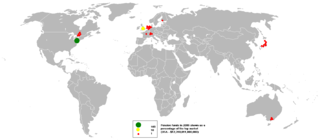
A pension fund, also known as a superannuation fund in some countries, is any plan, fund, or scheme which provides retirement income.

Infrastructure is the set of fundamental facilities and systems that support the sustainable functionality of households and firms. Serving a country, city, or other area, including the services and facilities necessary for its economy to function. Infrastructure is composed of public and private physical structures such as roads, railways, bridges, tunnels, water supply, sewers, electrical grids, and telecommunications. In general, infrastructure has been defined as "the physical components of interrelated systems providing commodities and services essential to enable, sustain, or enhance societal living conditions" and maintain the surrounding environment.
An institutional investor is an entity which pools money to purchase securities, real property, and other investment assets or originate loans. Institutional investors include banks, credit unions, insurance companies, pension funds, hedge funds, REITs, investment advisors, endowments, and mutual funds. Operating companies which invest excess capital in these types of assets may also be included in the term. Activist institutional investors may also influence corporate governance by exercising voting rights in their investments.

The Ontario Teachers' Pension Plan Board is an independent organization responsible for administering defined-benefit pensions for school teachers of the Canadian province of Ontario. Ontario Teachers' also invests the plan's pension fund, and it is one of the world’s largest institutional investors. The plan is a multi-employer pension plan, jointly sponsored by the Government of Ontario and the Ontario Teachers' Federation.

Caisse de dépôt et placement du Québec is an institutional investor that manages several public and parapublic pension plans and insurance programs in Quebec. A Crown corporation under the direction of the Canadian monarch, CPQD was founded in 1965 by an act of the National Assembly, under the government of Jean Lesage. It is the second-largest pension fund in Canada, after the Canada Pension Plan Investment Board. As of December 31, 2020, CDPQ managed assets of C$365 billion, invested in Canada and elsewhere. CDPQ is headquartered in Quebec City at the Price building and has its main business office in Montreal at Édifice Jacques-Parizeau.

Korea Development Bank is a wholly state-owned policy development bank in South Korea. It was founded in 1954 in accordance with The Korea Development Bank Act to finance and manage major industrial projects to expedite industrial development of Korea. As a 61st biggest global bank, KDB Bank has not only fostered the growth of strategic industries but also facilitates the turnaround of troubled companies through restructuring and provides capital for strategic development projects. Since 2000, it has diversified into investment banking services and operates as a CIB. Nevertheless, it is a major restructuring player and has saved a lot of big companies during major financial crisis, especially in 1997 Asian financial crisis and Financial crisis of 2007–2008.

An alternative investment is an investment in any asset class excluding stocks, bonds, and cash. The term is a relatively loose one and includes tangible assets such as precious metals, art, wine, antiques, coins, or stamps and some financial assets such as real estate, commodities, private equity, distressed securities, hedge funds, exchange funds, carbon credits, venture capital, film production, financial derivatives, and cryptocurrencies. Investments in real estate, forestry and shipping are also often termed "alternative" despite the ancient use of such real assets to enhance and preserve wealth. In the last century, fancy color diamonds have emerged as an alternative investment class as well. Alternative investments are to be contrasted with traditional investments.

Alberta Investment Management Corporation (AIMCo) is a Canadian Crown corporation and institutional investor established to manage several public funds and pensions headquartered in Edmonton, Alberta. AIMCo was established by an Act of the Legislative Assembly of Alberta in 2008 under the government of Progressive Conservative Premier Ed Stelmach.
The Canada Pension Plan Investment Board, operating as CPP Investments, is a Canadian Crown corporation established by way of the 1997 Canada Pension Plan Investment Board Act to oversee and invest the funds contributed to and held by the Canada Pension Plan (CPP).
The Ontario Municipal Employees Retirement System (OMERS) is a Canadian pension fund created by Ontario provincial statute in 1962 to manage the retirement benefits of all local government employees in the Canadian province of Ontario. It has become one of the largest institutional investors in Canada. As of December 31, 2020, OMERS had C$105 billion in net assets. OMERS serves 1,000 participating employers and more than half a million active, deferred and retired employees. OMERS members are employed by municipalities, school boards, transit systems, electrical utilities, emergency services and children's aid societies.
Impact investing refers to investments "made into companies, organizations, and funds with the intention to generate a measurable, beneficial social or environmental impact alongside a financial return". Impact investments provide capital to address social and/or environmental issues.
The Public Sector Pension Investment Board is a Canadian Crown corporation established by an act of Parliament in September 1999. PSP Investments is one of Canada's largest pension investment managers, with $168 billion of net assets under management as at March 31, 2019. It invests funds for the pension plans of the Public Service, the Canadian Armed Forces, the Royal Canadian Mounted Police and the Reserve Force.
Global Infrastructure Partners (GIP) is an infrastructure investment fund making equity and selected debt investments. GIP is headquartered in New York City and its equity investments are in infrastructure assets in the energy, transport and water/waste sectors. GIP employs approximately 150 investment and operational professionals and has offices in New York, London and Sydney and operational headquarters in Stamford, Connecticut. In total as at 2018, its portfolio companies employ approximately 21,000 people.
Infrastructure debt is the fixed income component of infrastructure assets. It provides yield enhancements, especially those dealing with capital preservation.
AMP Capital is a large global investment manager headquartered in Sydney, Australia. Its owner, AMP Group, was established in 1849, and is one of Australia's largest retail and corporate pension providers. AMP Capital has a strategic alliance with Mitsubishi UFJ Trust and Banking Corporation.

Mark Wiseman is a global investment manager and business executive. He is currently the chair of the Alberta Investment Management Corporation. He was a Senior Managing Director at BlackRock, Global Head of Active Equities, Chairman of its alternatives business, and Chairman of BlackRock's Global Investment Committee. He also served on BlackRock's Global Executive Committee. Prior to joining BlackRock in 2016, Wiseman was President and CEO of the Canada Pension Plan Investment Board (CCPIB).
Infrastructure-based economic development, also called infrastructure-driven development, combines key policy characteristics inherited from the Rooseveltian progressivist tradition and Neo-Keynesian economics in the United States, France's Gaullist and Neo-Colbertist centralized economic planning, Scandinavian social democracy as well as Singaporean and Chinese state capitalism: it holds that a substantial proportion of a nation’s resources must be systematically directed towards long term assets such as transportation, energy and social infrastructure in the name of long term economic efficiency and social equity.
Infrastructure is a platform for governance, commerce, and economic growth and is "a lifeline for modern societies". It is the hallmark of economic development.







